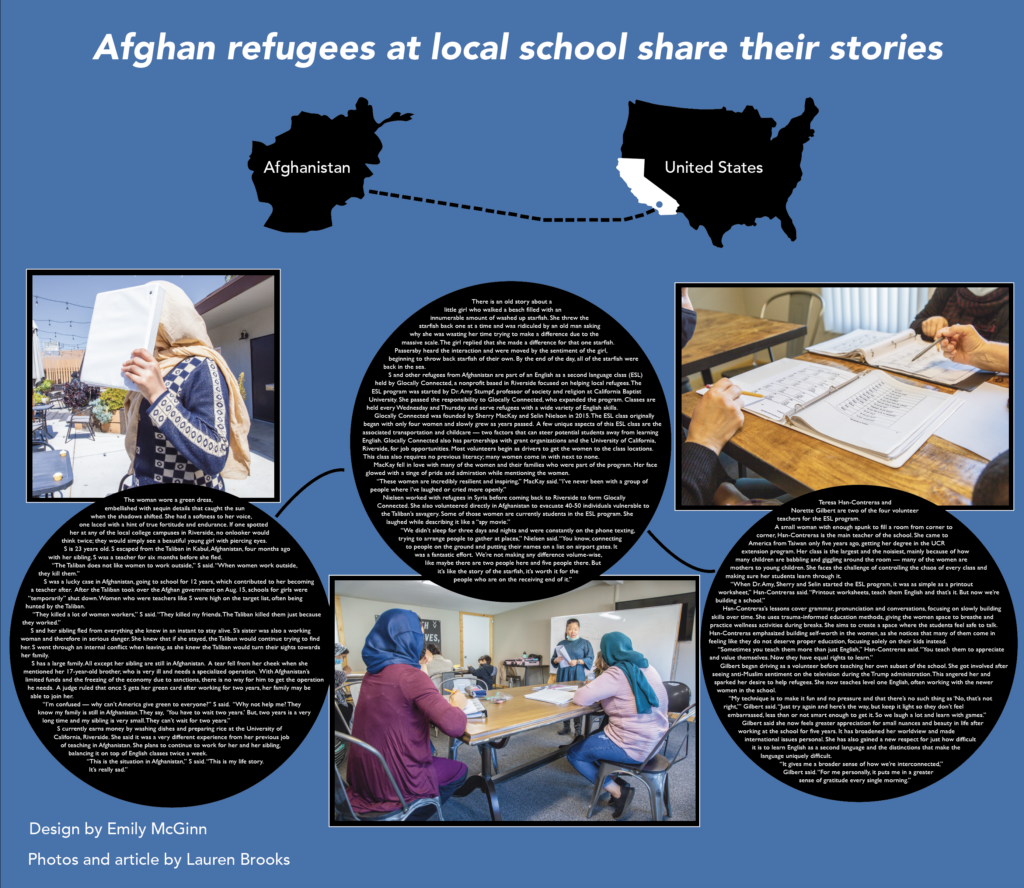
S
The woman wore a green dress, embellished with sequin details that caught the sun when the shadows shifted. She had a softness to her voice, one laced with a hint of true fortitude and endurance. If one spotted her at any of the local college campuses in Riverside, no onlooker would think twice; they would simply see a beautiful young girl with piercing eyes.
S is 23 years old. S escaped from the Taliban in Kabul, Afghanistan, four months ago with her sibling. S was a teacher for six months before she fled. “The Taliban does not like women to work outside,” S said. “When women work outside, they kill them.”
S was a lucky case in Afghanistan, going to school for 12 years, which contributed to her becoming a teacher after. After the Taliban took over the Afghan government on Aug. 15, schools for girls were “temporarily” shut down. Women who were teachers like S were high on the target list, often being hunted by the Taliban.
“They killed a lot of women workers,” S said. “They killed my friends. The Taliban killed them just because they worked.”
S and her sibling fled from everything she knew in an instant to stay alive. S’s sister was also a working woman and therefore in serious danger. She knew that if she stayed, the Taliban would continue trying to find her. S went through an internal conflict when leaving, as she knew the Taliban would turn their sights towards her family.
S has a large family. All except her sibling are still in Afghanistan. A tear fell from her cheek when she mentioned her 17-year-old brother, who is very ill and needs a specialized operation. With Afghanistan’s limited funds and the freezing of the economy due to sanctions, there is no way for him to get the operation he needs. A judge ruled that once S gets her green card after working for two years, her family may be able to join her.
“I’m confused — why can’t America give green to everyone?” S said. “Why not help me? They know my family is still in Afghanistan. They say, ‘You have to wait two years.’ But, two years is a very long time and my sibling is very small. They can’t wait for two years.”
S currently earns money by washing dishes and preparing rice at the University of California, Riverside. She said it was a very different experience from her previous job of teaching in Afghanistan. She plans to continue to work for her and her sibling, balancing it on top of English classes twice a week.
“This is the situation in Afghanistan,” S said. “This is my life story. It’s really sad.”

Selin and Sherry- Founders of Glocally Connected
There is an old story about a little girl who walked a beach filled with an innumerable amount of washed up starfish. She threw the starfish back one at a time and was ridiculed by an old man asking why she was wasting her time trying to make a difference due to the massive scale. The girl replied that she made a difference for that one starfish. Passersby heard the interaction and were moved by the sentiment of the girl, beginning to throw back starfish of their own. By the end of the day, all of the starfish were back in the sea.
S and other refugees from Afghanistan are part of an English as a second language class (ESL) held by Glocally Connected, a nonprofit based in Riverside focused on helping local refugees. The ESL program was started by Dr. Amy Stumpf, professor of society and religion at California Baptist University. She passed the responsibility to Glocally Connected, who expanded the program. Classes are held every Wednesday and Thursday and serve refugees with a wide variety of English skills.
Glocally Connected was founded by Sherry MacKay and Selin Nielson in 2015. The ESL class originally began with only four women and slowly grew as years passed. A few unique aspects of this ESL class are the associated transportation and childcare — two factors that can steer potential students away from learning English. Glocally Connected also has partnerships with grant organizations and the University of California, Riverside, for job opportunities. Most volunteers begin as drivers to get the women to the class locations. This class also requires no previous literacy; many women come in with next to none.
MacKay fell in love with many of the women and their families who were part of the program. Her face glowed with a tinge of pride and admiration while mentioning the women.
“These women are incredibly resilient and inspiring,” MacKay said. “I’ve never been with a group of people where I’ve laughed or cried more openly.”
Nielsen worked with refugees in Syria before coming back to Riverside to form Glocally Connected. She also volunteered directly in Afghanistan to evacuate 40-50 individuals vulnerable to the Taliban’s savagery. Some of those women are currently students in the ESL program. She laughed while describing it like a “spy movie.”
“We didn’t sleep for three days and nights and were constantly on the phone texting, trying to arrange people to gather at places,” Nielsen said. “You know, connecting to people on the ground and putting their names on a list on airport gates. It was a fantastic effort. We’re not making any difference volume-wise, like maybe there are two people here and five people there. But it’s like the story of the starfish, it’s worth it for the people who are on the receiving end of it.”
Teresa and Norette- Volunteer Teachers
Teresa Hsu-Contreras and Norette Gilbert are two of the four volunteer teachers for the ESL program.
A small woman with enough spunk to fill a room from corner to corner, Hsu-Contreras is the main teacher of the school. She came to America from Taiwan only five years ago, getting her degree in the UCR extension program. Her class is the largest and the noisiest, mainly because of how many children are babbling and giggling around the room — many of the women are mothers to young children. She faces the challenge of controlling the chaos of every class and making sure her students learn through it.
“When Dr. Amy, Sherry and Selin started the ESL program, it was as simple as a printout worksheet,” Hsu-Contreras said. “Printout worksheets, teach them English and that’s it. But now we’re building a school.”
Hsu-Contreras’s lessons cover grammar, pronunciation and conversations, focusing on slowly building skills over time. She uses trauma-informed education methods, giving the women space to breathe and practice wellness activities during breaks. She aims to create a space where the students feel safe to talk and create a sense of community.
Hsu-Contreras emphasized building self-worth in the women, as she notices that many of them come in feeling like they do not deserve proper education, focusing solely on their kids instead.
“Sometimes you teach them more than just English,” Hsu-Contreras said. “You teach them to appreciate and value themselves. Now they have equal rights to learn.”

Gilbert began driving as a volunteer before teaching her own subset of the school. She got involved after seeing anti-Muslim sentiment on the television during the Trump administration. This angered her and sparked her desire to help refugees. She now teaches level one English, often working with the newer women in the school.
“My technique is to make it fun and no pressure and that there’s no such thing as ‘No, that’s not right,’’’ Gilbert said. “Just try again and here’s the way, but keep it light so they don’t feel embarrassed, less than or not smart enough to get it. So we laugh a lot and learn with games.”
Gilbert said she now feels greater appreciation for small nuances and beauty in life after working at the school for five years. It has broadened her worldview and made international issues personal. She has also gained a new respect for just how difficult it is to learn English as a second language and the distinctions that make the language uniquely difficult.
“It gives me a broader sense of how we’re interconnected,” Gilbert said. “For me personally, it puts me in a greater sense of gratitude every single morning.”
For more information on Glocally Connected and information on the ESL class, visit @glocallyconnected on Instagram and their website glocallyconnected.org.



